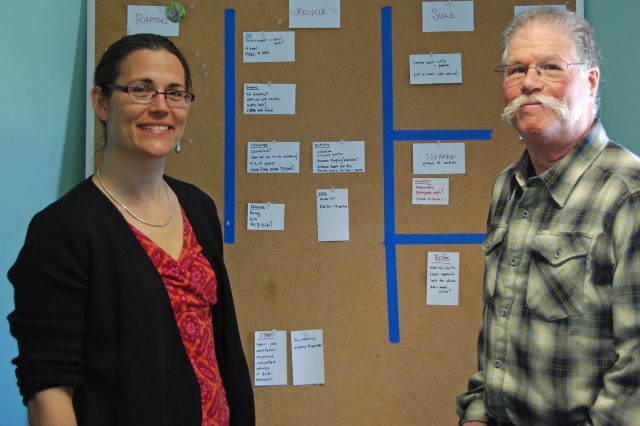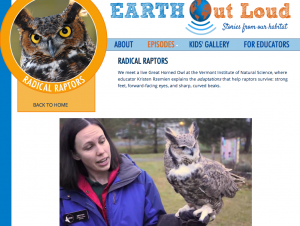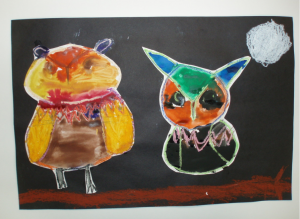COE, Musician/Fellow Launch Online Environmental Teaching Tool for Kids


The College of the Environment has teamed up with local singer/songwriter (and mother) Rani Arbo to debut the pilot version of “Earth Out Loud: Stories from Our Habitat” — an educational-but-entertaining online project where second and third graders can hear, explore and respond to stories from their habitat. It uses a straightforward interface to provide accessible audio and video clips for kids and their teachers that relate to their schools’ curriculum in an exciting way.

Arbo, COE director Barry Chernoff and Wesleyan student interns are still brainstorming and developing the content, but the infrastructure is now live and is being built upon.
“It started with a conversation Barry and I were having about science literacy in media and kids, about this time last year,” Arbo said. “I was a science major, and now I have a kid who is happiest outdoors, finding bugs and tadpoles. I’d been wishing he could do more with science in school, but in the younger grades, the focus is really on reading and math. So, Barry and I started talking about an environmental radio show for kids. Something that would help ensnare kids’ imaginations about environmental topics at a young age.”
While the concept still revolves around featuring radio-show-like audio tracks, it’s becoming clear that video may be equally important. So far there’s an episode on raptors and a segment on recycling, available in both audio and video formats. Upcoming episodes will touch upon the nature of bees, soils, and phases of matter, as applied to sweet treats like maple syrup, chocolate and Italian ice.
“If we’re going to make any progress in the world getting an environmental ethic into people, we have to get them excited at a young age,” said Chernoff. “We’re also interested in reaching communities that don’t have a single economic basis or ethnic or social structure — to be able to reach really broad audiences that include both inner city kids and rural kids.”
Though hands-on research-observation experience is always preferred as the primary teaching tool, online videos are a viable alternative for city dwellers.
“You can still engage that research-observational skill online,” said Arbo. “It’s not ideal, but for kids who can’t get out there, they can watch a bird fly online and learn from it. It’s still valid. We can still ask them, ‘What do you notice… what do you wonder about that?’”
“Earth Out Loud” is designed for kids to use on their own or with their parents, and also for teachers to easily incorporate into their existing science explorations. It aims to supplement in-class materials with something more exciting than a textbook, to spark the kids’ curiosity and motivate them to ask questions.
“The science curriculum in Connecticut begins in kindergarten, but it isn’t a focus in many schools, because science isn’t tested on the Connecticut Mastery Test until the later years. It’s already challenging for teachers to fit everything in, and sometimes they need to cover science through reading texts or math problems, rather than hands-on work, because of a lack of time, or space or resources,” Arbo said.
Chernoff believes it’s equally important to engage teachers, parents and the children to make the project work.
“It’s a triangle in a sense, and they each have to have this product be accessible to them at different levels and to be fun and not require a lot of input,” he said. “Kids are naturally curious. If you can help them look at the world in particular ways by answering their questions, they really love it. That’s something I think we should be encouraging.”
While the incoming generation of environmentalists will have a heavy burden to carry and countless problems to fix, Earth Out Loud does not aim to preach or frighten the students, just to help them develop an understanding and appreciation of nature. While it’s tempting to skip ahead to address the issues the Earth is facing, developing a solid foundation of caring appears to be the most effective route.

“Whatever they inherit, if kids learn to look at things and understand things then that appreciation will allow them to make decisions in a better way than my generation did,” Chernoff said.
There are two elements that make the new site different from other sites aiming to accomplish similar goals. For one, its simplicity and intuitiveness. The other is its distinctively local edge.
“It’s focused on Middletown and Connecticut at this point which is cool because all the episodes relate to the kids individually,” said “Earth Out Loud” intern Aviva Hirsch ’16. “The recycling episode traces a bottle from throwing it out to the recycling plant in Hartford.”
If all goes according to plan, the young audience the site was built for will have more of a say over its production. Kids will be encouraged to contribute artwork and poetry, post questions for Wes students to answer, and even be given recorders and cameras to record and direct their own episodes.
“I think it’s important to have kids to feel connected and feel some ownership and responsibility towards the environment, and this podcast is really inspiration more than cold hard facts,” says intern Megan Nash ‘14. “I think that’s really valuable, especially at this young age. To get kids to thinking critically and maybe at a deeper level than they would have with the regular science curriculum.”
In addition to the website, at 6:30 p.m. June 13, Earth Out Loud will host its first radio show titled “Fabulous Famers” on WESU 88.1 FM.
The pre-recorded live talk show features Spencer School second graders and student farmers from Wesleyan’s Long Lane farm. “The kids brought poems, we played some songs, and we talked about worms, soil, compost and planting. All programs will be archived on the Earth Out Loud web site under “Super Soil.”
Arbo also will speak on Stephan Allison’s “River Valley Rhythms,” show at 4 p.m. June 19 to talk about the Earth Out Loud Program.
For more information on the project, e-mail earthoutloud@wesleyan.edu.

